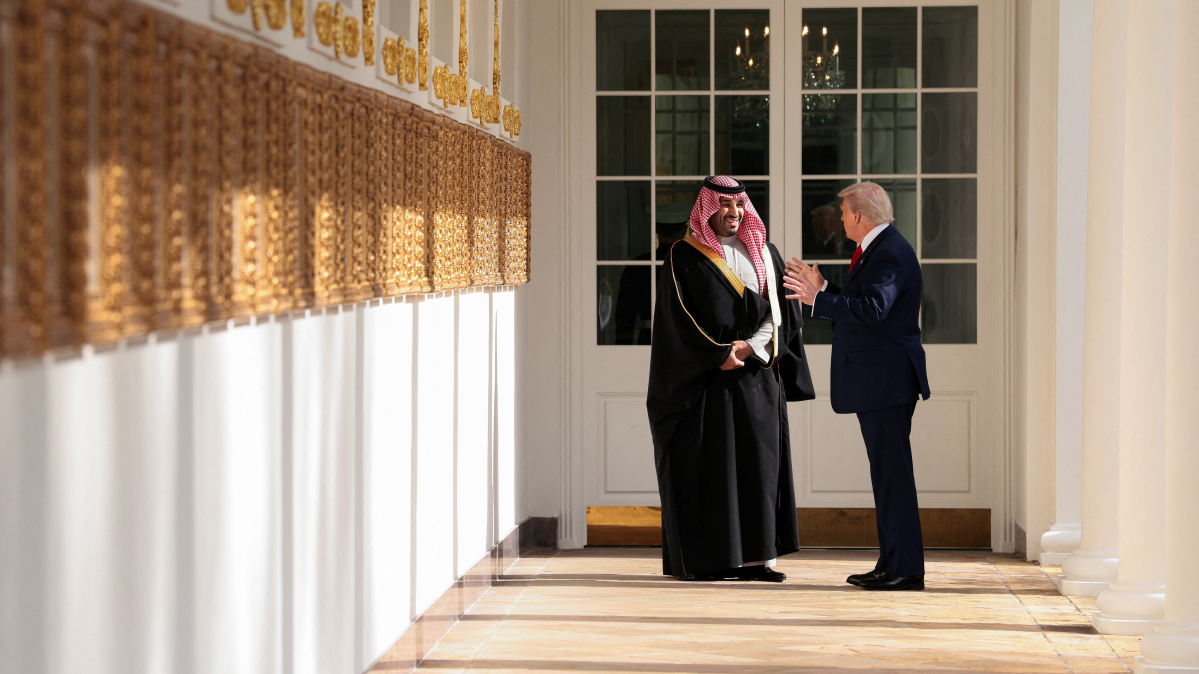Kyiv hit by massive missile strike as Zelenskyy calls for U.S. pressure on Russia
The Ukrainian capital came under a “massive” Russian missile attack early Thursday (12 February), with explosions heard across the capital accordi...

Donald Trump defended Saudi crown prince Mohammed bin Salman during talks at the White House, offering a different view from U.S. intelligence assessments on the 2018 killing of Jamal Khashoggi as the Saudi leader made his first Washington visit in more than seven years.
U.S. President Donald Trump used the crown prince’s high-profile visit to reiterate his position that Mohammed bin Salman did not have prior knowledge of the killing of Washington Post columnist Jamal Khashoggi at the Saudi consulate in Istanbul. The comments came as bin Salman sought to re-engage with the United States and reaffirm Saudi Arabia’s political and economic ties.
Khashoggi, who lived in the U.S. and was known for his critical commentary on Saudi policies, was killed by Saudi agents in 2018. U.S. intelligence agencies assessed that the crown prince approved the operation to capture or kill him. Bin Salman has denied ordering the killing, while acknowledging responsibility in his role as the kingdom’s de facto leader.
Speaking in the Oval Office, Trump said: "A lot of people did not like that gentleman that you are talking about. Things happened, but he knew nothing about it, and we can leave it at that."
Bin Salman described the episode as "painful" and said Saudi authorities carried out investigations and reforms to prevent similar incidents. "It’s a huge mistake," he noted, adding that steps had been taken to strengthen oversight.
During the visit, Trump also referred to progress on human rights in the kingdom, though he did not provide details. Human rights organisations continue to criticise Riyadh for detentions of activists and limits on dissent, issues that remain part of ongoing international discussions.
The White House event featured full ceremonial protocol, including a military honour guard, cannon salute and a flyover by U.S. aircraft. It marked a notable shift from the period immediately following Khashoggi’s killing, when U.S.-Saudi ties had come under significant strain.
Economic cooperation was a key part of the discussions, with bin Salman stating that Saudi Arabia intends to increase its planned U.S. investment from $600 billion to $1 trillion. He did not specify a timeframe or detailed breakdown of the sectors involved.
Security cooperation also featured prominently. Trump said the two sides had reached a "defence agreement" without elaborating and confirmed that Saudi Arabia intends to purchase U.S.-made F-35 fighter jets. Civil nuclear cooperation and business partnerships were also on the agenda.
On regional diplomacy, Trump said he received a "positive response" from the crown prince regarding the possibility of Saudi Arabia joining the Abraham Accords. Bin Salman reiterated that any formal normalisation with Israel would require a path toward Palestinian statehood, a position Riyadh has maintained for several years.
Bin Salman’s schedule included lunch with Trump in the Cabinet Room and a formal dinner, reflecting the administration’s interest in reasserting the importance of ties between the United States and Saudi Arabia. The meeting underscored Washington and Riyadh’s focus on strengthening economic, security and diplomatic cooperation as both sides navigate ongoing regional and global challenges.
The United States and Azerbaijan signed a strategic partnership in Baku on Tuesday (10 February) encompassing economic and security cooperation as Washington seeks to expand its influence in a region where Russia was once the main power broker.
Greek Prime Minister Kyriakos Mitsotakis arrived in Ankara on Wednesday, where Turkish President Recep Tayyip Erdoğan held an official welcoming ceremony at the Presidential Palace, marking the start of high-level talks between the two NATO allies.
Europe heads into the Munich Security Conference, 13 February, amid deepening unease over U.S. policy, as President Donald Trump’s hard-line stance on defence, trade and territory fuels doubts about Washington’s long-term commitment to transatlantic security.
The European Union is preparing a further expansion of its sanctions against Russia, with Central Asia emerging for the first time as a distinct point of focus.
A senior adviser to Iran’s Supreme Leader said on Tuesday that negotiations with the United States must remain focused on the nuclear issue and be grounded in realism, as Washington and Tehran prepare to resume talks mediated by Oman.
A Republican lawmaker accused on Wednesday (11 February) Attorney General Pam Bondi of concealing the names of Jeffrey Epstein’s powerful associates. The claim was made during a heated House hearing on the Justice Department’s handling of the files.
Start your day informed with AnewZ Morning Brief: here are the top news stories for the 12th of February, covering the latest developments you need to know.
The Ukrainian capital came under a “massive” Russian missile attack early Thursday (12 February), with explosions heard across the capital according to authorities. The assault unfolded as uncertainty lingers over upcoming U.S.-brokered peace talks.
The U.S. House of Representatives narrowly backed a measure on Wednesday (11 February) disapproving President Donald Trump's tariffs on Canada, a rare rebuke of the president and leaders of his party in the Republican-majority House.
Russia has attempted to "fully block" Meta Platforms-owned WhatsApp in the country, a company spokesperson told Reuters on Wednesday, as Moscow promotes home-grown platforms and seeks greater control over its internet space.
You can download the AnewZ application from Play Store and the App Store.

What is your opinion on this topic?
Leave the first comment